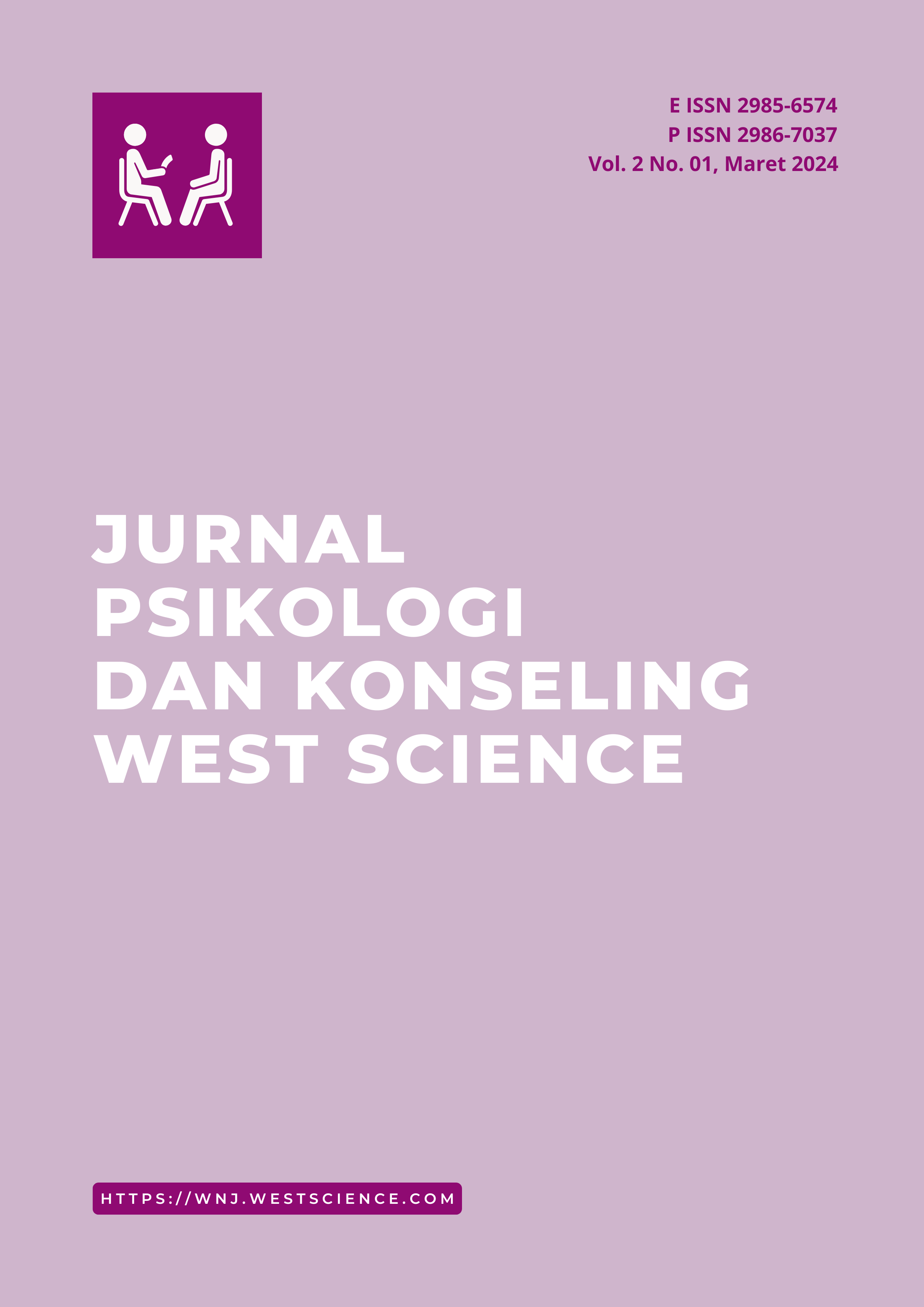Analisis Pengaruh Pola Asuh, Lingkungan Keluarga, dan Keterlibatan Orang Tua dalam Pendidikan terhadap Kemampuan Sosial-Anak Usia Dini di Kota Jakarta
DOI:
https://doi.org/10.58812/jpkws.v2i01.1042Kata Kunci:
Gaya pengasuhan, Lingkungan keluarga, Keterlibatan orang tua, Keterampilan sosial anak usia dini, Kota JakartaAbstrak
Penelitian ini menyelidiki pengaruh gaya pengasuhan, lingkungan keluarga, dan keterlibatan orang tua terhadap keterampilan sosial anak usia dini di Kota Jakarta. Sampel sebanyak 125 orang tua atau wali dari anak usia 3-6 tahun berpartisipasi dalam penelitian ini. Structural Equation Modeling-Partial Least Squares (SEM-PLS) digunakan untuk menganalisis hubungan antar variabel. Temuan menunjukkan efek langsung yang signifikan, dengan pola asuh otoritatif secara positif memprediksi keterampilan sosial anak usia dini, sementara gaya pengasuhan otoriter dan permisif menunjukkan hubungan yang negatif. Model pengukuran menunjukkan reliabilitas dan validitas yang memuaskan, dan model yang diestimasi memberikan kecocokan yang baik dengan data. Hasil penelitian ini menggarisbawahi pentingnya memelihara lingkungan keluarga yang mendukung, mempromosikan praktik pengasuhan yang positif, dan meningkatkan keterlibatan orang tua dalam membina perkembangan sosial anak usia dini dalam konteks perkotaan.
Referensi
Ahmad, M. A. (2019). Komunikasi sebagai wujud kompetensi sosial guru di sekolah.
Al Yakin, A., & Seraj, P. M. I. (2023). Impact of metaverse technology on student engagement and academic performance: the mediating role of learning motivation. International Journal of Computations, Information and Manufacturing (IJCIM), 3(1), 10–18.
Ali, N., Mukhtar, S., Khan, Y., Ahmad, M., & Khan, Z. U. (2022). ANALYSIS OF SECONDARY SCHOOL STUDENTS’ACADEMIC PERFORMANCE AND PARENTAL INVOLVEMENT IN CHILDREN EDUCATION AT HOME. Образование и Наука, 24(9), 118–142.
Aloia, L. S., & Strutzenberg, C. (2023). Family Cohesion in Adulthood as a Function of Parenting Style in Childhood and Enduring Personality Traits. The Family Journal, 31(2), 288–295.
Bracken, B. A., & Theodore, L. A. (2023). Promoting Health and Wellness in Young Children: Preschool Assessment. Perspectives on Early Childhood Psychology and Education, 5(1), 7.
Cosso, J., von Suchodoletz, A., & Yoshikawa, H. (2022). Effects of parental involvement programs on young children’s academic and social–emotional outcomes: A meta-analysis. Journal of Family Psychology, 36(8), 1329.
Del Prette, Z. A. P., & Del Prette, A. (2019). Studies on social skills and social competence in Brazil: A history in construction. Psychology in Brazil: Scientists Making a Difference, 41–66.
Dobell, A. P., Faghy, M. A., Pringle, A., & Roscoe, C. M. P. (2023). Improving Fundamental Movement Skills during Early Childhood: An Intervention Mapping Approach. Children, 10(6), 1004.
ERGİN, B., ERGİN, E., & KILIÇOĞLU, E. A. (2023a). The Relation between Social Development Indicators in Early Childhood and Parenting Practices. İnsan ve Toplum Bilimleri Araştırmaları Dergisi, 12(1), 43–59.
Fazrin, I., & Radjak, S. A. M. (2023). The Role Of Social Environment On The Development Of Pre-School Age Children (3-5 Years) In Dharma Wanita Tosaren Ii Kindergarten School Kediri City. Journal of Global Research in Public Health, 8(1), 7–13.
Haisraeli, A., & Fogiel-Bijaoui, S. (2023). Parental involvement in school pedagogy: a threat or a promise? Educational Review, 75(4), 597–616.
Han, Y., & Hock, K. E. (2023). The relationship between parenting stress and social skills of preschool children. South Asian Journal of Social Sciences and Humanities, 4(2), 118–132.
Honrubia Montesinos, C., Gil Madrona, P., Losada Puente, L., Brian, A., & Saraiva, L. (2023). The relationship between early childhood teachers’ professional development in physical education and Children’s fundamental movement skills. Early Education and Development, 1–14.
Hukkelberg, S., & Ogden, T. (2020). What is social competence? An investigation into the concept among children with antisocial behaviours. Emotional and Behavioural Difficulties, 25(1), 80–93.
Irwin, L. G., Siddiqi, A., & Hertzman, G. (2007). Early child development: A powerful equalizer. Citeseer.
Kurniawan, K. (2023). Parentinguistics: Authoritarian and Permissive Communication Styles in Parents’ Expressive Speech Acts. Langkawi: Journal of The Association for Arabic and English, 15–27.
Lee, J., Kubik, M. Y., Fulkerson, J. A., Kohli, N., & Garwick, A. E. (2020). The identification of family social environment typologies using latent class analysis: Implications for future family-focused research. Journal of Family Nursing, 26(1), 26–37.
Mayangsari, C. A., Utomo, C. B., & Pujiati, A. (2020). Building Characters and Socio-Culture Values to Generation Z of Batik Craftsman Family in Pekalongan. JESS (Journal of Educational Social Studies), 9(2), 1–9.
Nurhayati, N., & Rondonuwu, R. J. (2023). THE RELATIONSHIP BETWEEN PARENTAL INVOLVEMENT AND STUDENTS’ACADEMIC ACHIEVEMENT. J-Simbol: Jurnal Magister Pendidikan Bahasa Dan Sastra Indonesia, 11(1 Apr), 43–53.
Ramos, A. M., Shewark, E. A., & Leve, L. D. (2022a). Family interactions in toddlerhood influence social competence in preschool age: Accounting for genetic and prenatal influences. Frontiers in Psychology, 13, 975086.
Rianti, A. C. (2022). Social Construction of Young Married Couples in Parenting Children in South Jakarta. IJESS International Journal of Education and Social Science, 3(2), 49–54.
Rohayani, F., Murniati, W., Sari, T., & Fitri, A. R. (2023). Pola Asuh Permisif dan Dampaknya Kepada Anak Usia Dini (Teori dan Problematika). Islamic EduKids: Jurnal Pendidikan Anak Usia Dini, 5(1), 25–38.
Sitorus, N. S., & Nurhafizah, N. (2023a). The Influence of Parenting Styles on Early Childhood Social Skills. AL-ISHLAH: Jurnal Pendidikan, 15(2), 2367–2374.
Skura, M., & Świderska, J. (2022). The role of teachers’ emotional intelligence and social competences with special educational needs students. European Journal of Special Needs Education, 37(3), 401–416.
Tuerk, C., Anderson, V., Bernier, A., & Beauchamp, M. H. (2021). Social competence in early childhood: An empirical validation of the SOCIAL model. Journal of Neuropsychology, 15(3), 477–499.
Utami, A. Y. (2022). The Role of Parental Involvement in Student Academic Outcomes.
Vega, M., Penugonda, C., & Chunn, J. (2022). Analyzing the Extent of Authoritarian Parenting on Academic Achievement: Ethical Lens: Different Parenting Styles’ Effects on Academic Success and Wellbeing. Journal of Student Research, 11(1).
Yao, R. (2023a). Effects of parenting styles on young children’s social skills. SHS Web of Conferences, 171, 01017.
Unduhan
Diterbitkan
Cara Mengutip
Terbitan
Bagian
Lisensi
Hak Cipta (c) 2024 Supriandi Supriandi, Yenik Pujowati

Artikel ini berlisensiCreative Commons Attribution-ShareAlike 4.0 International License.



















 Instagram
Instagram 